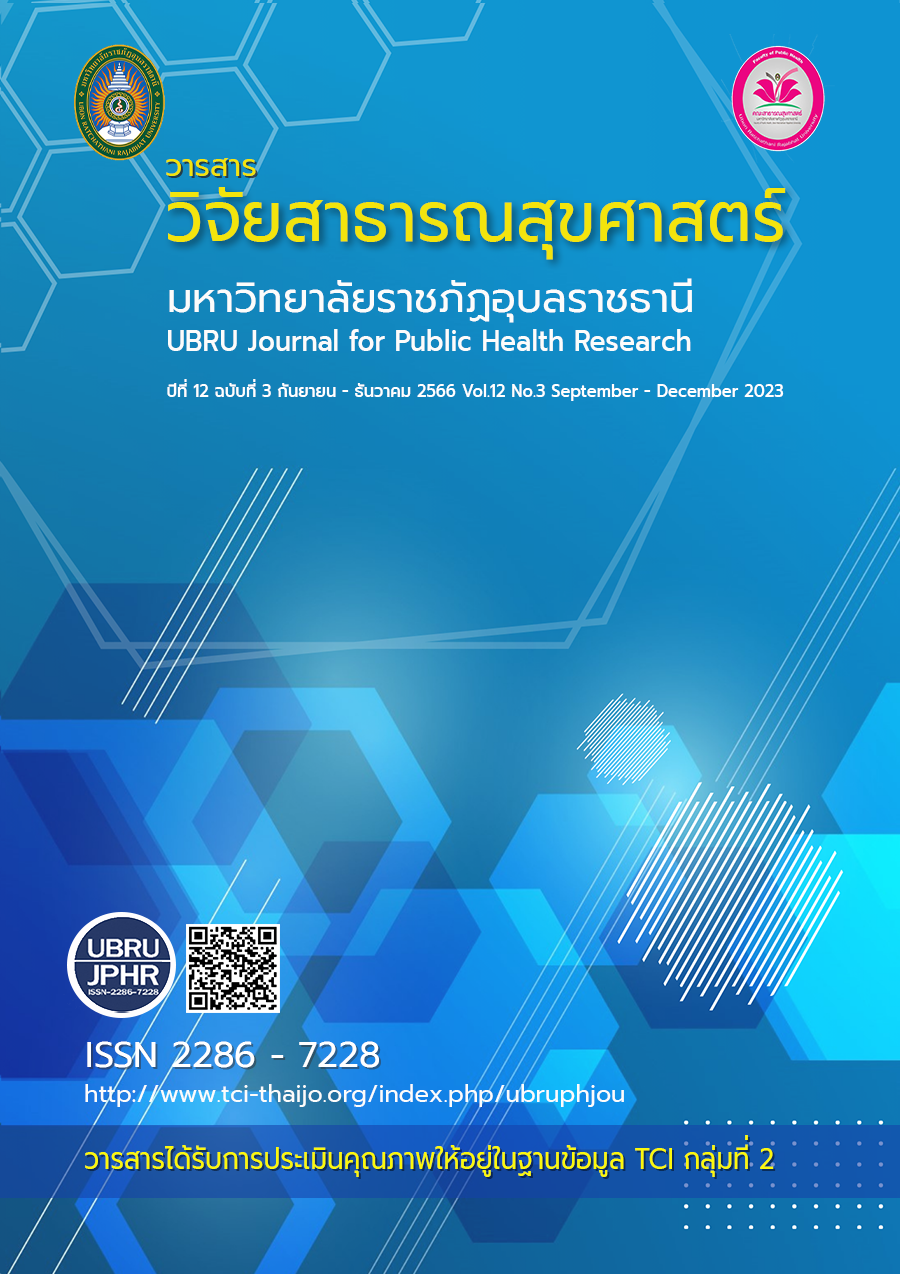The development of recycle waste management model, case study of building, Department of Science Service
Keywords:
Recycled waste, solid waste management in the workplace, participatoryAbstract
The objective of this action research was to develop a recycled waste management model for the the Mard Building, Department of Science Services, Ministry of Higher Education, Science, Research and Innovation. This action research consisted of 4 phases which were P: planning, A: action, O: observation, and R: reflection. There were 184 participants who were divided into the following categories: 1) civil servants; 2) government employees; 3) employees; 4) housekeepers; and 5) security guards. The target group was relevant people in recycling waste management. The researcher selected 124 samples by using convenience sampling. Data were collected using a questionnaire. Data were analyzed by using statistics such as mean, percentage, and Paired Samples Test. Qualitative data were analyzed using content analysis.
The findings revealed that this model comprised of 9 steps as follows: 1) Actual solid waste analysis in the specific area, 2) Organizing workshops, 3) Summary of issues, and problems and action plan preparation, 4) Implementation of the specified plan, 5) Media creation related to knowledge and public relations, 6) Public relations and knowledge sharing by representative networks, 7) Pre-and post-performance evaluation,
8) Behavioral observation and participation and, 9) Organizing activities to exchange knowledge. By measuring and observing the behavior of the sample, it was found that there were statistically significant positive changes in knowledge, practice, and participation (p-value < 0.05). However, there was no statistically significant change in attitudes regarding recycled waste. Thus, overall performance results reveal that this model could increase recycled waste management by 3.73 percent. It is considered a systematic approach to waste disposal and can be developed into a sustainable approach further.
In summary, this action research focused on participatory management principles and academic principles. However, there were important developmental factors including knowledge, attitude, practice, and participation. The main finding was the simultaneous improvement in correct behavior in knowledge and practice. The suggestion is that there should be a study of new approaches to improve the solid waste management behavior of the population correctly and appropriately for the specific area. However, solid waste management still depends on appropriate further development towards changing good and correct attitudes, which will require time and appropriate techniques for further sustainable development.
References
กรมส่งเสริมส่งเสริมคุณภาพสิ่งแวดล้อม กระทรวงทรัพยากรธรรมชาติและสิ่งแวดล้อม. (2543). สถานการณ์สิ่งแวดล้อมของประเทศไทย ฉบับ พ. ศ. 2546. กรุงเทพมหานคร.
สำนักงานปลัดกระทรวงทรัพยากร ธรรมชาติและสิ่งแวดล้อม. (2561). รายงานสถานการณ์ขยะมูลฝอยชุมชนของประเทศไทย ปี พ.ศ. 2561. กรุงเทพมหานคร.
กรมคุมคุมมลพิษ. (2564). รายงานการจัดการมูลฝอย ปี พ.ศ. 2564. กรุงเทพมหานคร.
กรมคุมคุมมลพิษ. (2565). รายงานการจัดการมูลฝอย ปี พ.ศ. 2565. กรุงเทพมหานคร.
คุณาพงศ์ คตวงศ์. (2560). การพัฒนารูปแบบการจัดการมูลฝอยของท้องถิ่น โดยการมีส่วนร่วมของขุมชน เทศบาลตำบลโนนสุวรรณ อำเภอโนนสุวรรณ จังหวัดบุรีรัมย์. วิทยานิพนธ์ปริญญาสาธารณสุขศาสตรมหาบัณฑิต มหาวิทยาลัยมหาสารคาม.
ฐิติกานต์ คุ้นเคย. (2561). ปริมาณขยะรีไซเคิลและการปล่อยก๊าซเรือนกระจกจากกิจกรรมธนาคารขยะของ มหาวิทยาลัยที่เข้าร่วมโครงการของสภาอุตสาหกรรม. มหาวิทยาลัยราชภัฏสวนสุนันทา.
จันทกร จันดี. (2560). การจัดการขยะ ในชุมชนชาวลาหู่: กรณี ศึกษาบ้านแม่ปูนล่าง หมู่ที่ 9 ตำบลเวียง อำเภอเวียงป่าเป้า จังหวัดเชียงราย. มหาวิทยาลัยธรรมศาสตร์. กรุงเทพมหานคร.
ดิษฐพล ใจซื่อ. (2560). สถานการณ์ขยะ และการจัดการ ขยะที่ต้นทางใน ชุมชน อำเภอวาปีปทุม จังหวัดมหาสารคาม. วารสาร โรงพยาบาลมหาสารคาม, 14(3), 38-46.
เอกรินทร์ ตั้งนิธิบุญ. (2562). ชุมชนต้นแบบ การจัดการ ขยะมูลฝอยด้วยแนวคิด ขยะเหลือศูนย์ (Zero waste) ของชุมชนพูนบำเพ็ญ แขวงภาษีเจริญ. กรุงเทพมหานคร.
คเชนทร์ ชาญประเสริฐ. (2560). รูปแบบการพัฒนาพฤติกรรมสุขภาพ การควบคุมค่าดัชนีมวลกายและรอบเอวบุคลากร กลุ่มเสี่ยงโรคเบาหวาน สำนักงานสาธารณสุขอำเภอเมืองขอนแก่น จังหวัดขอนแก่น. วารสารสำนักงานสาธารณสุข จังหวัดขอนแก่น, 1(2), 133-146.
วาสนา พรหมนวล (2564). การศึกษาการจัดการขยะและถังขยะแยกตามพื้นที่กรณีศึกษา: องค์การบริหารส่วนตำบลบึงคอไห. วารสารวิจัยวิชาการ, 4(1), 105-112.
Downloads
Published
How to Cite
Issue
Section
License
Copyright (c) 2023 คณะสาธารณสุขศาสตร์ มหาวิทยาลัยราชภัฏอุบลราชธานี

This work is licensed under a Creative Commons Attribution-NonCommercial-NoDerivatives 4.0 International License.
เนื้อหาและข้อมูลในบทความที่ลงตีพิมพ์ในวารสารวารสารวิจัยสาธารณสุขศาสตร์ มหาวิทยาลัยราชภัฏอุบลราชธานี ถือเป็นข้อคิดเห็นและความรับผิดชอบของผู้เขียนบทความโดยตรงซึ่งกองบรรณาธิการวารสาร ไม่จำเป็นต้องเห็นด้วย หรือร่วมรับผิดชอบใดๆ
บทความ ข้อมูล เนื้อหา รูปภาพ ฯลฯ ที่ได้รับการตีพิมพ์ในวารสารนี้ ถือเป็นลิขสิทธิ์ของวารสารฯ หากบุคคลหรือหน่วยงานใดต้องการนำทั้งหมดหรือส่วนหนึ่งส่วนใดไปเผยแพร่ต่อหรือเพื่อกระทำการใดๆ จะต้องได้รับอนุญาตเป็นลายลักอักษรณ์จากบรรณาธิการวารสารนี้ก่อนเท่านั้น


